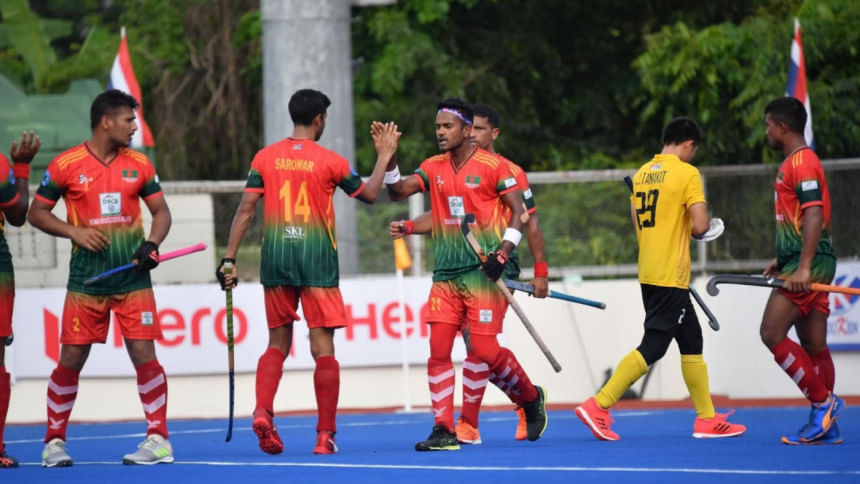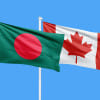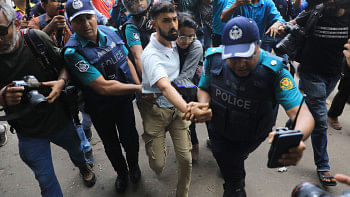An onerous quest to restore stability

It can be quite hard to imagine hockey's popularity in the country was only second to football in the 80's. Although football's craze was unmatched back then, hockey boasted a fair share of spectators who thronged stadiums to watch domestic and international matches. A once prospectus discipline, however, could not meet expectations at the turn of the millennium despite having occupied a special place in people's hearts.
Names of Abdus Sadek, Pratap Sankar Hazra, Ehtesam Sultan, Sona Mia, Sabbir Yousuf, Ibrahim Saber, Bashir Ahmed, Ehsan Nammi are bound to pop up while revisiting Bangladesh hockey. Also, a certain tournament created a shockwave of interest among fans: the 1985 Men's Asia Cup in Dhaka following Bangladesh's impressive performances against heavyweights Pakistan, China, Japan, and Iran.
Performances of goalkeeper Mohsin, Jummon Lusai, Shahabuddin Chakladar, Khaza Rezwon Arzu, Alamgir Chunnu, Abdullah Piru, Jasimuddin Kanchan, Waliul Islam Nasim, Salahuddin Tisha, Abdul Malek Chunnu, Barkat Ullah Chapal, Jamil Parvez Lulu and Kamrul Islam Kismat arrived as inspiration for aspiring hockey players across the country.
Amid huge interest and with brilliant players like Mahbub Harun, Sadekul, Mamunur Rashid, Kamal, Musa Mia, Akter, Nixon, Sajul Mahmud, and others, Bangladesh team were primed to shine at international level.
Bangladesh Hockey Federation (BHF), however, could not cash in on the overflowing craze. The reasons behind hockey's lingering lean patch revolve around the usual suspects: lack of vision and leadership at both clubs and federations, coupled with their financial shortcomings, a faulty domestic structure based on a lack of infrastructure, and so on.
It is worth breaking down the factors responsible in this case.
Destabilsed domestic structure: The structure of domestic competitions plays a pivotal vital role in taking any genre of sports forward. The fact that the domestic hockey league took place once in two to three years in Bangladesh had left players to consider other options for their bread and butter.
Since BHF's inception in 1972, the local regulatory body held the top-fight hockey competition titled "First Division Hockey League" almost regularly: 19 times in 23 years from 1974 to 1997. However, when it was renamed to the "Premier Division Hockey League", the last 25 years saw the top-tier competition held only 13 times.
Subsequently, uncertainty trickled down to lower division leagues and the national league. Thus, with irregularly held competitions and lack of lucrative payments over the years, the fervour for hockey almost diminished completely.
Former national player-cum-coach Mahbub Harun recalled that he received Tk 3 lakh payment from a club when he was first called for the national team in 1989. Interestingly a national player also received more or less Tk 3 lakh around 34 years later.
The players of Mahbub's generation and his predecessors were part of club transfers almost every season but the current generation got only four transfers in the last 10 years, forcing them to seek opportunities in different professions while national team's pipeline suffered.
Disinterested clubs: Once clubs were the driving force of Bangladesh hockey and everything revolved around their activities, but due to financial constraints the clubs resorted to remaining uninterested in playing league every year.
Moreover, with no district leagues in place, the known breeding grounds of hockey players -- Faridpur, Jashore, Rajshahi, Mymensingh, Sylhet, Chattogram, and a few other districts -- kept losing their output.
As a result, the sole burden of responsibility fell on BKSP -- an educational institute providing hockey players since 1996 after starting its journey in 1986 -- to be the source of all national hockey players.
As clubs continue to defer leagues every time, citing financial constraints, BHF has also been unable to bring clubs into the league by providing necessary financial incentives.
The last edition of the Premier Hockey League was held in 2021 because of Prime Minister Sheikh Hasina's financial incentive to the clubs. One-and-a-half years have already passed by but clubs still remain reluctant to participate in the premier league.
Missing plan and leadership: The demand from players to roll the league had fallen on deaf ears, time and again, while organisers fought among themselves to hold positions in the federation. In turn, BHF hardly had any visionary leader to steer Bangladesh in the direction of world level.
Meanwhile, hockey, which is arguably one of the fastest sports, has evolved in such a way that it has become more difficult for inactive nations to keep up.
The current high-ups in BHF have come unopposed and their tenure is set to run for the next four years. Their primary challenge lies in holding premier league, which saw one edition in past four years, and pulling it off would steer Bangladesh hockey in the right direction.
Outdated infrastructure: Once hockey was played on grassy turf which had long been replaced by fast artificial turf. Except the turf at BKSP, the federation could not increase the number of artificial turf from the one at Maulana Bhasani Hockey Stadium, where top to lower division leagues take place and clubs and national teams prepare ahead of any competitions.
It, therefore, left no room for upcoming players to familiarise themselves with artificial turfs. Besides, a lack of modern equipment in training also impeded progress of Bangladesh hockey.
Road map to recovery: With the rise of other sports and changing societal priorities, BHF has to think differently to ensure the premier league gets to roll on every year, as well as introduce new competitions in the form of franchise-based tournaments that will, most importantly, provide financial safety net for players.
A concerted effort from all stakeholders is crucial to overcoming the existing challenges and unlocking the nation's true potential in this sport. Hockey federation and the government must address those challenges and implement sustainable solutions: investing in infrastructure and facilities at least in divisional headquarters, ensuring a good financial flow with collaboration with sponsors and from direct financial assistance from the government, promoting youth and school hockey to make it popular among the young ones, strengthening domestic leagues and, last but not the least, giving players the all-important international exposure to realise target.

 For all latest news, follow The Daily Star's Google News channel.
For all latest news, follow The Daily Star's Google News channel. 








Comments